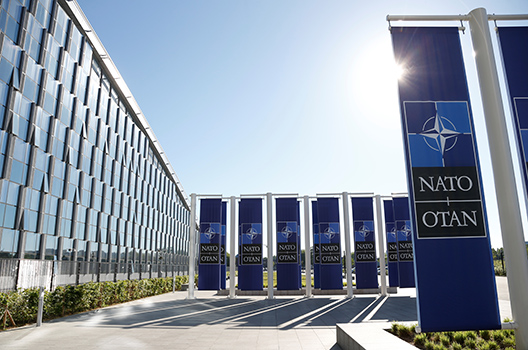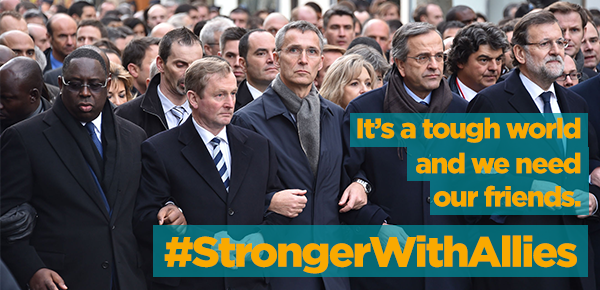 The United States’ complaint that few of its allies meet the 2 percent of GDP defense spending goal is likely to dominate the discourse at the NATO Summit in Brussels on July 11 and 12. While adequate burden sharing is important to maintain credible capabilities, this discussion will distract from what else is happening in the world and how potential adversaries and competitors are developing.
The United States’ complaint that few of its allies meet the 2 percent of GDP defense spending goal is likely to dominate the discourse at the NATO Summit in Brussels on July 11 and 12. While adequate burden sharing is important to maintain credible capabilities, this discussion will distract from what else is happening in the world and how potential adversaries and competitors are developing.
Even when given time, NATO summits typically focus on traditional deterrence, such as the forward deployment of troops and pre-positioning of equipment. While the importance of traditional deterrence cannot be understated, the development of untraditional deterrence is equally crucial. This includes the willingness, ability, and means to deploy cutting-edge technologies, chief among them artificial intelligence (AI).
The potential large-scale impact of AI has only been acknowledged on the fringes of security debates and by technology experts. The assessment and impact of AI systems, however, cannot be left to the “nerds.” NATO must begin to understand the impact of AI and have discussions about its potential use by and against the Alliance.
US Secretary of Defense James Mattis said in his January 19 announcement of the US National Defense Strategy: “success does not go to the country that develops a new technology first, but rather, to the one that better integrates it and more swiftly adapts its way of fighting.” AI debates often devolve into arguments over “killer robots.” AI, however, will have a profound impact on NATO’s organization, operations, and cooperation. Its successful adoption will help the Alliance maintain its competitive edge and deterrence capability.
For example, AI will profoundly change military organizational planning and coordination. The implementation of AI in the battlefield would mean advancing into a “hyper war” where current decision-making processes will be disrupted by the enormous speed of development and the ability of machine learning by AI applications. It is, therefore, key for the Alliance to implement AI applications into their militaries’ planning, operations, and coordination.
AI also has huge potential for NATO’s intelligence, surveillance, and reconnaissance (ISR) activities. NATO is already leveraging AI to sift through and exploit the massive amounts of data generated by new and advanced weapon systems. New fifth-generation fighter planes are not only traditional weapon systems, but also important data collectors. AI could also assist in tracking down missile sites. These examples and the few initiatives started by NATO’s Allied Command Transformation (ACT) are pursued mainly on the Alliance’s operational and tactical levels. There have still been no direct deliberations about the implications of AI amongst NATO’s top political and strategic leaders.
NATO is also at risk of AI being used against it by potential adversaries. As Tomáš Valášek of Carnegie Europe argued, “AI can be effectively deployed to undermine trust among countries fighting on the same side by discrediting their intelligence.” NATO missions and operations, which involve a high number of different countries and military organizations, are already heavily dependent on data and information exchange. Adversarial AI applications could influence, and even alter, information and communication amongst NATO allies while an operation is ongoing, creating confusion and distrust.
NATO’s lack of action on AI is in stark contrast to the rise of China as a global AI leader. China released its 2020 AI ambitions and aims to be world leader by 2030. It is already developing complex sensor networks in the private sector with disrupting potential for the military domain. There is a real risk that China will be setting universal legal and technical standards for the use of AI if the Alliance, or nations by themselves, do not set out a clear AI strategy and have a real discussion on AI implementation and exploitation.
For example, China requires Apple to adhere to different privacy settings for Chinese iPhone users. Data must be stored on Chinese servers, meaning Chinese intelligence services will have access to this information. Beijing has few privacy and ethical concerns about using AI, for example, facial recognition and surveillance by AI applications, which allows it to implement these technologies in the security sector much faster.
Russia also recognizes the disruptive potential of AI, not just on the battlefield, but also in global power relations. Russian President Vladimir Putin said: “artificial intelligence is the future, not only for Russia but for all humankind…Whoever becomes the leader in this sphere will become the ruler of the world.”
Russia is still lagging behind China and the United States in AI, but it has great ambitions. The Kremlin’s Military Industrial Committee has set a target of making 30 percent of military equipment robotic—and hence (partially) run by AI—by 2025.
There are ongoing efforts by some member states to utilize AI and the United States has been ramping up its activities. The Pentagon’s Maven project aims to utilize the latest technology from Silicon Valley for military purposes (despite heavy criticism from the private sector over implementation of AI for lethal purposes) and the United States recently announced it will establish an official AI hub for its military, the Joint Artificial Intelligence Center. In Europe, individual European Union (EU) member states have been working on their individual AI strategies, with one of the most notable being the French.
As for the European Union, only this year twenty-five of its members signed a Declaration of Cooperation on AI, declaring their intentions to join forces and engage in a European approach to deal with AI. But is it all too little, too late?
“AI is on the verge of becoming a critical part of our societies” says former German State Secretary of Defense Katrin Suder. At the same time, AI and its implications have never been on the agenda at a NATO Summit.
As the late French Prime Minister Georges Clemenceau once said: “War is too important a matter to be left to the military.”
The same rings true for AI: AI is too important to be relegated to discussions on NATO’s operational and tactical levels. NATO’s political and strategic leaders need to lay out a vision for AI’s role in the Alliance, before it is too late.
Karlijn Jans is a Legacy Fellow with Young Professionals in Foreign Policy, holds Masters degrees from Maastricht University and King’s College London, and was a visiting student at the Netherlands Defence Academy.
The Atlantic Council is supporting the #StrongerWithAllies campaign, promoting the idea that the United States is stronger and safer with friends abroad. Please join our effort by visiting StrongerWithAllies.org and using our social media toolkit to share your own content about why we’re #StrongerWithAllies.
Image: The new NATO headquarters building is pictured in Brussels, Belgium, May 7, 2018. (REUTERS/Francois Lenoir)

